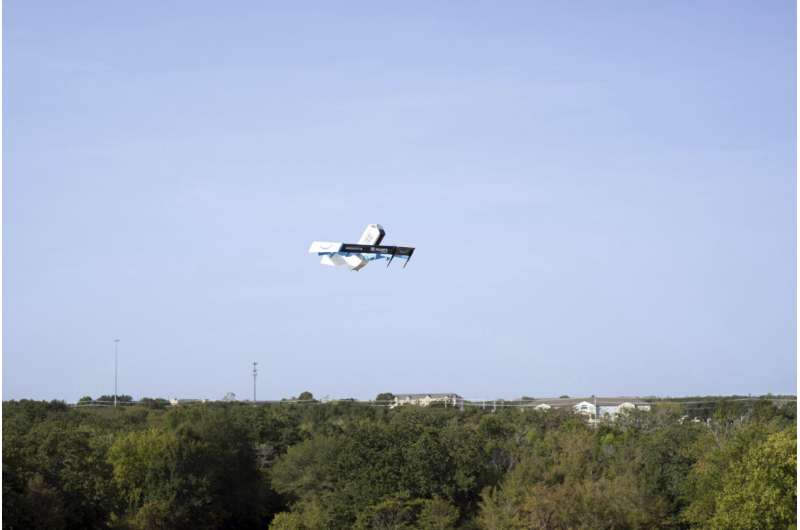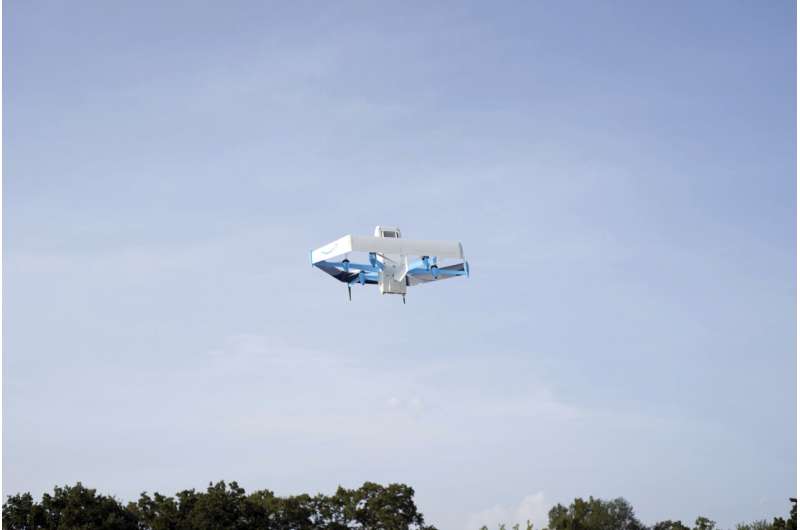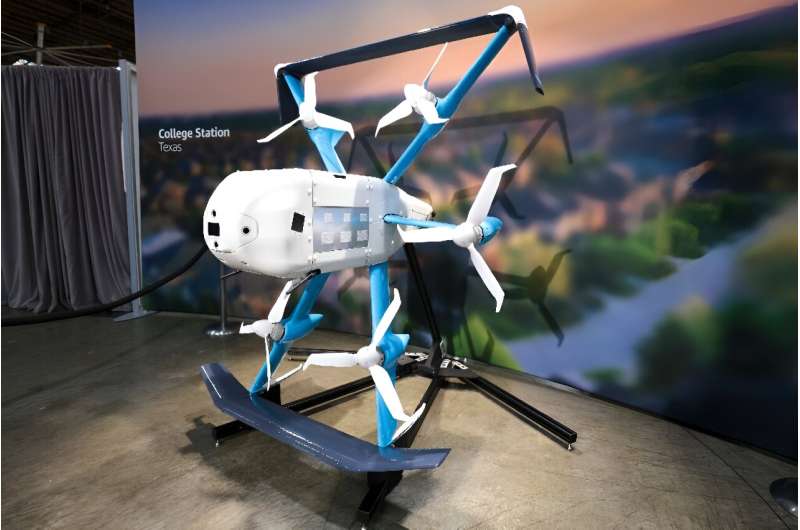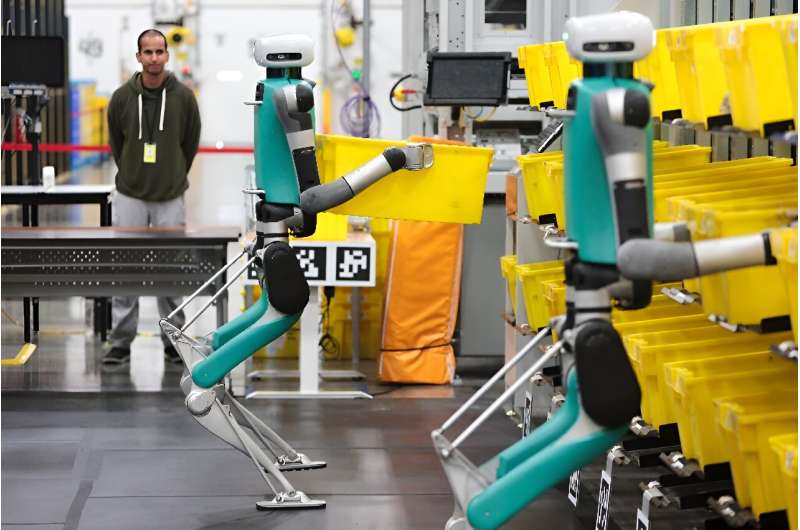
Amazon will soon make prescription drugs fall from the sky when the e-commerce giant becomes the latest company to test drone deliveries for medications.
The company said Wednesday that customers in College Station, Texas, can now get prescriptions delivered by a drone within an hour of placing their order.
The drone, programed to fly from a delivery center with a secure pharmacy, will travel to the customer's address, descend to a height of about four meters—or 13 feet—and drop a padded package.
Amazon says customers will be able to choose from more than 500 medications, a list that includes common treatments for conditions like the flu or pneumonia, but not controlled substances.
The company's Prime Air division began testing drone deliveries of common household items last December in College Station and Lockeford, California. Amazon spokesperson Jessica Bardoulas said the company has made thousands of deliveries since launching the service, and is expanding it to include prescriptions based in part on customer requests.
Later on Wednesday, Amazon announced it will also launch drone delivery at a third U.S. location and cities in Italy and the United Kingdom by the end of next year. The company said it will disclose the exact locations in the coming months.
Amazon Prime already delivers some medications from the company's pharmacy inside of two days. But pharmacy Vice President John Love said that doesn't help someone with an acute illness like the flu.
"What we're trying to do is figure out how can we bend the curve on speed," he said.
Amazon Pharmacy Chief Medical Officer Dr. Vin Gupta says the U.S. health care system generally struggles with diagnosing and treating patients quickly for acute illnesses, something that was apparent throughout the COVID-19 pandemic.
Narrowing the window between diagnosis and treating makes many treatments more effective, he said.

Amazon is not the first company to explore prescription deliveries by drone. The drugstore chain CVS Health worked with UPS to test deliveries in 2019 in North Carolina but that program has ended, a CVS spokesman said.
Intermountain Health started providing drone deliveries of prescriptions in 2021 in the Salt Lake City area and has been expanding the program, according to Daniel Duersch, supply chain director for the health care system. Intermountain is partnering with the logistics company Zipline to use drones that drop packages by parachute.
Companies seeking to use drones for commercial purposes have faced hurdles from regulators who want to make sure things are operating safely. Amazon founder Jeff Bezos had predicted a decade ago that drones would be making deliveries by 2018. Even now, the e-commerce giant is only using the technology in a small number of markets.
Lisa Ellman, the executive director of the Commercial Drone Alliance, an industry group that counts Amazon as one of its members, said to date, regulatory approvals have been limited to specific geographic areas and "in terms of their scope and usefulness to companies."
That said, she noted regulators have also been issuing more approvals. Last month, the FAA gave the OK for Zipline and UPS to fly longer-range drones.
Walmart has also been working to expand its own drone deliveries.
Also on Wednesday, Amazon unveiled a new drone called MK30 that, by the end of next year, will replace the drones it currently uses to delivery packages. The company says the new drone flies further, is smaller and quieter, and also has enhanced delivery capabilities.
Amazon has said its drones will fly as high as 120 meters, or nearly 400 feet, before slowly descending when they reach the customer's home. The drone will check to make sure the delivery zone is clear of pets, children or any other obstructions before dropping the package on a delivery marker.
Amazon has been growing its presence in health care for a few years now.
Aside from adding a pharmacy, it also spent nearly $4 billion to buy primary care provider One Medical. In August, the company added video telemedicine visits in all 50 states.
© 2023 The Associated Press. All rights reserved. This material may not be published, broadcast, rewritten or redistributed without permission.
Amazon to expand drone delivery into Britain and Italy

Amazon on Wednesday said it hopes to expand drone delivery into Britain and Italy by late next year, as it unveiled new warehouse robots and tech in its race to get shoppers what they want quickly.
The Seattle-based e-commerce colossus said it will expand drone delivery of certain purchases to a third US state as well as to the two European countries by the end of 2024.
Amazon delivery drones are already at work in California and Texas, and a new MK30 model will be able to operate in more extreme weather conditions than those currently in use, Amazon Prime Air vice president David Carbon said during a marketing event.
"Our customers have always wanted things faster and I think this is a way we can get to it at scale," said Prime AI director of engineering Jason Patrao, adding that the drone program, while currently small, "is going to be something that I think we will all get used to."
Amazon has also installed a new robotics system called Sequoia in one of its Texas logistics centers, the company said.
The system features automated vehicles, gantry cranes, mechanical arms, computer vision technologies and ergonomic workstations for employees, a presentation showed.
Amazon already uses 750,000 robots in its warehouses, but the idea is to make the various machines more interoperable, according to executives.
"It becomes magical when you blend multiple robotics systems with our amazing people," said Amazon Robotics chief technologist Tye Brady.
Sequoia can identify and put away stock in warehouses "up to 75 percent faster" than was previously possible, the company said in a statement.
And order processing time can be reduced by 25 percent in best-case scenarios.
"This means we can list items on sale on Amazon.com more quickly, benefitting both sellers and customers," Amazon said.
Traditional brick-and-mortar stores still account for about 80 percent of retail business, but sales are likely to shift more online the more such immediate gratification through fast delivery becomes available, analysts said.
"The better they get at delivery, the more it continues to grow the e-commerce market overall and Amazon's place within that market," said Insider Intelligence analyst Andrew Lipsman.

The popular online shopping platform became a lifeline for many during the pandemic, but since this year it has been facing a new kind of competition from Chinese e-commerce apps.
Fashion retailer Shein and especially Temu, which offers beauty products, homeware and electronics, have won over many consumers with their low prices.
"Given how aggressively Temu is trying to compete with Amazon and the money they seem to be willing to spend on logistics and getting cheap goods to people, I'm sure Amazon has some level of concern," Lipsman said.
Jobs versus robots
Without specifying whether jobs would be lost through the use of robots, Amazon emphasized the gains in terms of safety, sparing workers from repetitive tasks and even creating jobs.
"Over the past ten years, we have installed hundreds of thousands of robotic systems while creating hundreds of thousands of jobs," the group stressed.
"We think that the repetitive, the mundane work that people do, we do see that shifting more to robotics," said Scott Dresser, vice president for Amazon robotics.
"There's also an opportunity to make things safer, when people (are) bending and lifting heavy objects, when people are walking miles in the fulfillment center," he said.
Amazon, the second-largest employer in the US, just behind Walmart, will also be testing android-like machines from Agility Robotics to carry plastic bins.
"There's about a million unfilled logistics, manual labor jobs" in the United States currently, said Agility cofounder Damion Shelton.
"The problem is not that you're even taking a job... The problem is there's no person to even do the work," he said.
But increased productivity via robots won't fix underlying Amazon worker issues, critics say.
"It's not going to change their logic. And their logic is 'use these workers up and throw them away'," said Sheheryar Kaoosji, executive director of the Warehouse Worker Resource Center, a nonprofit dedicated to improving warehouse industry conditions in southern California.
© 2023 AFP
Explore further

No comments:
Post a Comment